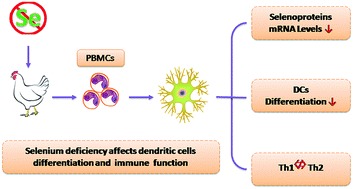当前位置:
X-MOL 学术
›
Metallomics
›
论文详情
Our official English website, www.x-mol.net, welcomes your feedback! (Note: you will need to create a separate account there.)
Selenium deficiency inhibits differentiation and immune function and imbalances the Th1/Th2 of dendritic cells
Metallomics ( IF 3.4 ) Pub Date : 2018-05-03 00:00:00 , DOI: 10.1039/c8mt00039e Zhepeng Sun 1, 2, 3, 4 , Zhe Xu 1, 2, 3, 4 , Dongxu Wang 1, 2, 3, 4 , Haidong Yao 1, 2, 3, 4 , Shu Li 1, 2, 3, 4
Metallomics ( IF 3.4 ) Pub Date : 2018-05-03 00:00:00 , DOI: 10.1039/c8mt00039e Zhepeng Sun 1, 2, 3, 4 , Zhe Xu 1, 2, 3, 4 , Dongxu Wang 1, 2, 3, 4 , Haidong Yao 1, 2, 3, 4 , Shu Li 1, 2, 3, 4
Affiliation

|
Selenium (Se) deficiency inhibits immune cell differentiation, affects immune response, and leads to cellular and humoral immune dysfunction. However, the impact of Se deficiency on the differentiation and Th1/Th2 balance of dendritic cells is still unclear. In this study, we replicated a model of Se-deficient chickens by feeding the chickens with a low-Se diet (i.e., the content of Se is 0.008 mg per kg diet). On this basis, we explored the effect of Se deficiency on the differentiation of chicken dendritic cells by induction culture of peripheral blood monocyte cells. We induced chicken dendritic cells by incubating mononuclear cells with a 100 ng mL−1 recombinant chicken granulocyte-macrophage colony-stimulating factor and 20 ng mL−1 recombinant chicken IL-4 for total 7 days. The results showed that Se deficiency decreased the expression of cell-surface markers including CD11c, CD40, CD86, and MHC II. Furthermore, we analyzed the cytokine profiles using real-time quantitative PCR and ELISA. The results indicated that Se deficiency inhibited the expression of selenoproteins and changed the secretion of IL-10, IL-12p40, and IFN-γ. Additionally, Se deficiency weakened the ability of dendritic cells to stimulate the proliferation of mixed allogeneic lymphocytes. In conclusion, Se deficiency suppressed the differentiation and immune function of chicken dendritic cells by down-regulating the expression of CD11c, CD40, CD86, MHC II, and selenoproteins. The result also showed that the Th1/Th2 imbalance was induced by enhancing the secretion of Th1-type cytokine IL-12p40 and IFN-γ and reducing that of Th2-type cytokine IL-10. Our findings contribute to understanding the mechanism of Se deficiency in the differentiation and immune function of chicken dendritic cells.
中文翻译:

硒缺乏会抑制分化和免疫功能,并使树突状细胞的Th1 / Th2失衡
硒缺乏会抑制免疫细胞分化,影响免疫反应,并导致细胞和体液免疫功能障碍。然而,硒缺乏对树突状细胞分化和Th1 / Th2平衡的影响尚不清楚。在这项研究中,我们通过饲喂低硒饮食(即,硒的含量为0.008 mg / kg饮食)来复制低硒鸡模型。在此基础上,我们通过诱导培养外周血单核细胞探索了硒缺乏对鸡树突状细胞分化的影响。我们通过将单核细胞与100 ng mL -1重组鸡粒细胞-巨噬细胞集落刺激因子和20 ng mL -1一起孵育来诱导鸡树突状细胞重组鸡IL-4共7天。结果表明,硒缺乏降低了CD11c,CD40,CD86和MHC II等细胞表面标志物的表达。此外,我们使用实时定量PCR和ELISA分析了细胞因子谱。结果表明,硒缺乏会抑制硒蛋白的表达,并改变IL-10,IL-12p40和IFN-γ的分泌。此外,硒缺乏会削弱树突状细胞刺激混合同种异体淋巴细胞增殖的能力。总之,硒缺乏通过下调CD11c,CD40,CD86,MHC II和硒蛋白的表达而抑制了鸡树突状细胞的分化和免疫功能。结果还表明,通过增强Th1型细胞因子IL-12p40和IFN-γ的分泌并减少Th2型细胞因子IL-10的分泌来诱导Th1 / Th2失衡。我们的发现有助于理解硒缺乏症在鸡树突状细胞分化和免疫功能中的作用机理。
更新日期:2018-05-03
中文翻译:

硒缺乏会抑制分化和免疫功能,并使树突状细胞的Th1 / Th2失衡
硒缺乏会抑制免疫细胞分化,影响免疫反应,并导致细胞和体液免疫功能障碍。然而,硒缺乏对树突状细胞分化和Th1 / Th2平衡的影响尚不清楚。在这项研究中,我们通过饲喂低硒饮食(即,硒的含量为0.008 mg / kg饮食)来复制低硒鸡模型。在此基础上,我们通过诱导培养外周血单核细胞探索了硒缺乏对鸡树突状细胞分化的影响。我们通过将单核细胞与100 ng mL -1重组鸡粒细胞-巨噬细胞集落刺激因子和20 ng mL -1一起孵育来诱导鸡树突状细胞重组鸡IL-4共7天。结果表明,硒缺乏降低了CD11c,CD40,CD86和MHC II等细胞表面标志物的表达。此外,我们使用实时定量PCR和ELISA分析了细胞因子谱。结果表明,硒缺乏会抑制硒蛋白的表达,并改变IL-10,IL-12p40和IFN-γ的分泌。此外,硒缺乏会削弱树突状细胞刺激混合同种异体淋巴细胞增殖的能力。总之,硒缺乏通过下调CD11c,CD40,CD86,MHC II和硒蛋白的表达而抑制了鸡树突状细胞的分化和免疫功能。结果还表明,通过增强Th1型细胞因子IL-12p40和IFN-γ的分泌并减少Th2型细胞因子IL-10的分泌来诱导Th1 / Th2失衡。我们的发现有助于理解硒缺乏症在鸡树突状细胞分化和免疫功能中的作用机理。



























 京公网安备 11010802027423号
京公网安备 11010802027423号